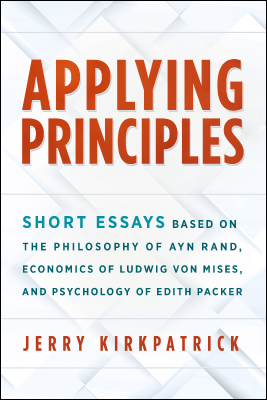Scholarly works in the Objectivist and Austrian Traditions
Preface • Excerpt • Behind the Scenes
 Excerpt
Excerpt
Applying Principles:
Short Essays Based on the Philosophy of Ayn Rand, Economics of Ludwig von Mises, and Psychology of Edith Packer
by Jerry Kirkpatrick, Ph.D., Professor emeritus of International Business and Marketing, California State Polytechnic University, Pomona (Cal Poly Pomona)
Hardcover: $34.95, Softcover $16.95, Ebook $6.99
Buy: Amazon, Barnes & Noble, IndieBound
Ebook: Kindle, Apple Books, B&N Nook, Kobo, or Smashwords
Libraries: Ingram or Baker & Taylor
Excerpt: The Epistemology of Ethics, Salesmanship, and Basket Weaving
In a previous post I said that teachers are peddlers of ideas who must sell their wares as much as any other sales rep or entrepreneur. The process by which soap and ideas are sold is essentially the same. The method is persuasive communication and the purveyors of both can be honest or dishonest. There is nothing unique to the theory of salesmanship that makes sales reps more prone to dishonesty than teachers, and teaching in a free market is salesmanship.
In this post I would like to make a similarly iconoclastic statement about three apparently disparate fields, namely that ethics, salesmanship, and basket weaving are all applied sciences. The first anomaly, according to many hard core philosophers and scientists, is that I would dare to call any of these fields a science. The second is that I would dare to lump them together with equal epistemological standing. Let me take these one at a time.
In its broadest sense, science studies reality—not just the physical, but also the mental—and aims to describe it accurately and provide guidelines for human choices and actions. In this sense philosophy is the science of all sciences, because it identifies the broadest abstractions about reality and provides the broadest guidelines for the rest of the special sciences. The special sciences, whether physics, engineering, medicine, or basket weaving, must be consistent with the more general sciences, but they in turn describe their own areas of reality and provide guidelines for choice and action to achieve specific goals in those realms.
To explain and predict are said today to be the two aims of science. Explanation, however, implies prediction. If a ball is described as round, for example, the description predicts that the ball will roll. This positivist view of science as explanation and prediction leaves values out completely. Values are guides to action. If a ball is to be thrown accurately to a target, then it is valuable for the hand, arm, and rest of the body to move in a certain way. A scientist of ball throwing prescribes which actions have to be made in order to achieve the goal of hitting a target. To live a healthy and moral life, scientists of nutrition and ethics also prescribe certain actions that must be taken to achieve the respective goals. There are two aims of science, but they are to explain and guide. Guidance specifies a goal and the actions necessary to reach the goal. All value theories are sciences of guidance. This applies equally to ethics, salesmanship, and basket weaving. (For doubters about basket weaving as a science, a Google search generates millions of hits and refers the searcher to an enormous literature describing the principles of basket weaving.)
Value theories are applied “how to” sciences and are just as factual as any so-called hard or descriptive physical science. Value theories describe how to get things done. Ethics describes how to live the good life, salesmanship describes how to sell products, and basket weaving how to make baskets. Nothing could be more factual than that, which makes all of these fields as scientific as physics, chemistry, or biology.Value theories are applied “how to” sciences and are just as factual as any so-called hard or descriptive physical science. Value theories describe how to get things done. Ethics describes how to live the good life, salesmanship describes how to sell products, and basket weaving how to make baskets. Nothing could be more factual than that, which makes all of these fields as scientific as physics, chemistry, or biology.
For that matter, epistemology is also a how-to discipline, since its aim is to describe how we know what we know and then, on the basis of that knowledge, to prescribe how to improve our ways of knowing. As a result, there is no difference in essential methodology used by epistemology and ethics, or ethics and salesmanship, or salesmanship and basket weaving. They all use the same approach to identifying the concepts and principles that constitute their particular subjects of study. The only relevant difference among all of these disciplines is level of abstraction. The concepts and principles of epistemology and ethics are far more abstract than those of salesmanship and basket weaving.
Putting on an air of superiority simply because one works in an area of greater abstraction smacks of what Robert Fuller would call rankism (1, 2). Science is science and applied science is applied science. As much can be learned from blue-collar workers who love their jobs and approach them with attention to subtle detail as one can learn from college professors who work in the stratosphere of theoretical concepts and principles. In many cases one can learn more from blue-collar workers than from professors, because the latter are too often caught up in their own jargon to be able to relate it to the lay person. And some professors all too often have no desire to relate their work to the lay person. But everyone today in our knowledge economy holds, or should hold, equal epistemological standing in the generation and application of knowledge.
One does not pay plumbers so much for what they do as for what they know. That makes plumbers, basket weavers, sales reps, and ethicists all fellow professionals.
(April 26, 2009)


